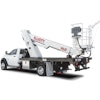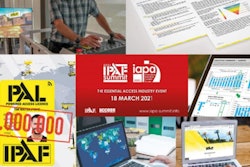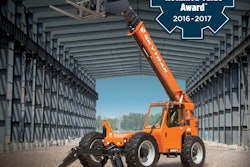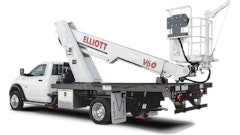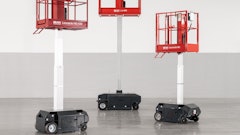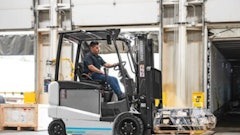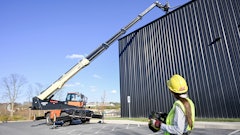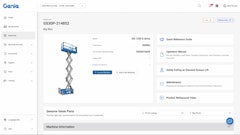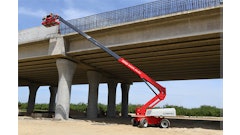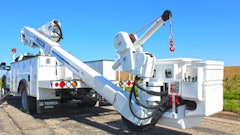
IPAF’s ‘new generation’ training program offers a new weapon in the armory for accredited training centers: An eLearning online module that allows PAL Card trainees to undergo the theory element of the course at their own convenience, anywhere, on any device and at a time of their choosing. Since it launched in early 2017, take-up has gathered pace and the eLearning module is currently available in six languages with more to follow.
At the end of 2016, IPAF introduced a new way of training towards the PAL Card operator’s license. This “New Generation” of training initially took the form of an eLearning module aimed at replicating the theory element of the PAL Card course, normally delivered in a classroom environment. Candidates must still complete the practical element of training, and pass a theory and practical test under the supervision of an IPAF-accredited instructor or evaluator, but the eLearning is no doubt a valuable addition to IPAF’s global training program, and has steadily increased in popularity since it was first unveiled early in 2017.
The main benefits of the eLearning, which has been designed and delivered in conjunction with IPAF’s online training partner Bolt Learning, are that trainees can attempt the learning module any time up to 40 days prior to taking the practical module and exam, at any time, in any location, and on the device of their choosing. This in turn can mean PAL Card candidates need to take less time away from the job, and for those who do not have an accredited test center nearby, minimize the time required to complete the full training to receive their PAL Card.
As the PAL Card is the powered access industry’s leading recognized qualification, with almost three quarters of a million valid PAL Cards currently in circulation around the world, the eLearning is now available in six languages, with more set to follow.
How does eLearning work?
eLearning couldn’t be simpler to undertake, and once a trainee has signed up to an IPAF Pal Card course, the training center delivering the instruction will issue them with a web link and a log-in code to access the eLearning online. It's compatible with most computers and tablet devices, and there is a short compatibility checker that candidates should complete to check they have the correct browser in an up-to-date version.
But surely an online training module can’t replicate what an instructor in a classroom can deliver? In fact, the online delivery has a number of benefits – candidates can pause the training whenever they like, for instance, though it is advisable that they keep a couple of hours clear to complete the course without distraction. Also, some of the graphical demonstrations in the eLearning are very effective ways of demonstrating the principles of safe MEWP operation, for instance, when considering risks or illustrating how load distribution works when rotating or extending a boom-type platform. And each section is followed up with a mini-test to help reinforce the messaging.
In a classroom environment where there could be several candidates all progressing through the theory element together, it might be difficult for the instructor to find a pace of delivery that keeps all candidates happy; while some candidates might in fact be very experienced MEWP operators, others could be complete novices, and keeping a classroom of candidates with wildly differing experience levels happy might not be very easy. Factor in issues such as candidates who are not undertaking training in their first language and the eLearning does offer great flexibility.
There are built-in safeguards to ensure the eLearning is given due attention and not just glossed over. Candidates cannot skip sections or advance without having got the questions right, and they can revisit any section of the tutorials or tests if there’s anything they are unclear on. Finally, the eLearning module can be retaken as many times as the candidate likes – for instance, those who complete the eLearning but want a quick refresher prior to undergoing the practical part of the training can do so to their heart’s content. Once the eLearning is complete, the candidate will get a receipt with a unique identifier code which will be cross-checked by the training center when the candidate turns up for the practical.
A serious undertaking
Giles Councell, Director of Operations at IPAF and the man in charge of overseeing the eLearning as it was developed and rolled out to training centers, says: “The eLearning project was one of the more significant projects undertaken by IPAF in terms of training development; we knew it would be a great benefit to trainees and training centers alike and would open up new possibilities in terms of IPAF’s goal of pushing out robust training to all operators and managers of MEWP equipment around the world.
“It’s been really heartening to note that, after a long and detailed development and testing phase, the training is now available in six languages and is being taken up with increasing enthusiasm by IPAF training partners worldwide.
“It’s important to note, however, that IPAF is still firmly committed to maintaining a strong practical element to its training courses and has no plan to change this now or in future; the New Generation training is just another string to our bow and is designed to extend new flexibility for training centers and their training candidates."
He continues, “All IPAF’s investment into the eLearning is also designed to enhance the traditional face-to-face training, providing trainees more choice in how they complete the PAL Card course and giving better resources for the classroom instructors to use as well.”
Tamlin Roberts, MD of Bolt Training, adds: “We have worked with a great many organizations in a number of countries, so we knew our expertise could have really positive applications for a partner such as IPAF. We developed the eLearning module for IPAF by taking a forensic look at how the instruction was being delivered in the classroom, and considering ways we could replicate this and indeed enhance for delivery in an online format.
“We’ve been really pleased to receive positive feedback from IPAF and also the training centers and their successful trainees, and we’re not resting on our laurels either, as we constantly monitor and update the eLearning module to improve it. We’re also developing new language variants, enhancing the quality and photorealism of the 3D videos and also looking at other applications, such as standalone classroom aids, and even a virtual reality application that takes users through a pre-use inspection.
“This is currently just a demo, but it does offer a glimpse into the role that new technology can play in improving technical and safety instruction and offers trainees and test candidates the opportunity of trying out various scenarios without physically placing them in the way of potential harm.”

